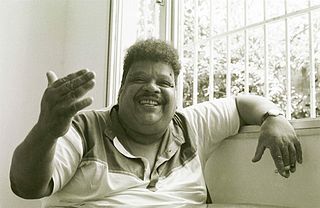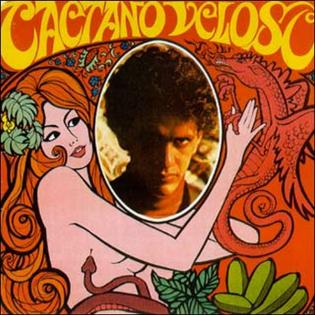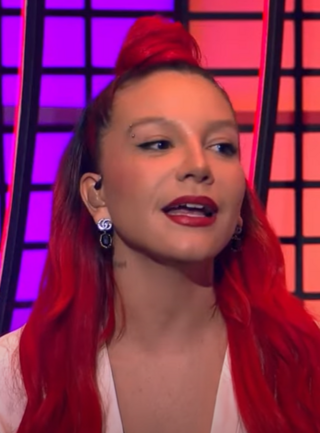
Roberto Carlos Braga is a Brazilian singer-songwriter, also known as "King of Latin Music" or simply "the King". Most of his songs were written in partnership with his friend, singer and songwriter Erasmo Carlos. Roberto Carlos has sold over 70 million albums around the world. He is considered one of the most influential artists in Brazil, being cited as a source of inspiration by many artists and bands. His net worth is estimated at US$160 million.
Brazilian rock refers to rock music produced in Brazil and usually sung in Portuguese. In the 1960s, it was known as iê-iê-iê, the Portuguese transcription of the line "Yeah, yeah, yeah" from the Beatles song "She Loves You".

Sebastião "Tim" Rodrigues Maia was a Brazilian musician, songwriter, and businessman known for his iconoclastic, ironic, outspoken, and humorous musical style. Maia contributed to Brazilian music within a wide variety of musical genres, including soul, funk, disco, jazz, rock and roll, rhythm and blues, romantic ballads, samba, bossa nova, baião and música popular brasileira (MPB). He introduced the soul style on the Brazilian musical scene. Along with Jorge Ben, Maia pioneered sambalanço, combining samba, soul, funk and rock and roll. He is recognized as one of the biggest icons in Brazilian music.

Erasmo Carlos was a Brazilian singer and songwriter, most closely associated with his friend and longtime collaborator Roberto Carlos. Together, they created many chart hits including "É Proibido Fumar", "Sentado à beira do caminho", "Além do Horizonte", "Amigo" and "Festa de Arromba".

Caetano Veloso is the debut solo album by the artist of the same name, released in Brazil in 1968. He had released Domingo the year before in collaboration with Gal Costa. It was one of the first Tropicália efforts, and features arrangements by Júlio Medaglia, Damiano Cozzella, and Sandino Hohagen, as well as an eclectic assortment of influences, demonstrating the "antropofagia" of the Tropicália movement. Sounds from psychedelia, rock, pop, Indian music, bossa nova, Bahian music and other genres appear on the album. It includes the hit songs "Alegria, Alegria", "Tropicália", and "Soy loco por ti, América".

Wanderléa Charlup Boere Salim is a Brazilian singer and former co-host of the historic television show Jovem Guarda alongside Roberto Carlos and Erasmo Carlos. The show aired on TV Record between 1965 and 1968. Wanderléa was nicknamed Ternurinha after her first hit "Ternura".

Jovem Guarda was primarily a Brazilian musical television show first aired by Rede Record in 1965, although the term soon expanded to designate the entire movement and style surrounding it. The members of the program were singers who had been influenced by the American rock n' roll of the late 1950s and British Invasion bands of the 1960s, although the music often became softer, more naïve versions with light, romantic lyrics aimed at teenagers. They were Roberto Carlos, Erasmo Carlos and Wanderléa, with other bands and musicians appearing on the show as guests.

Chitãozinho & Xororó are a Brazilian sertanejo duo. Chitãozinho is the stage name of José Lima Sobrinho and Xororó of Durval de Lima. Their music, which combines traditional Brazilian caipira with pop, was instrumental in establishing the sertanejo genre. They have sold over 40 million albums since their first album was released in 1969.

Sergio Bavini, known as Sérgio Reis, is a Brazilian sertanejo singer, actor and politician. He has sold approximately 16 million copies of his more than 40 album releases.

Pro-Música Brasil (PMB), previously Associação Brasileira dos Produtores de Discos (ABPD), is an official representative body of the record labels in the Brazilian phonographic market.

É Proibido Fumar is the third album recorded by the Brazilian singer Roberto Carlos. Released in 1964 and produced by Evandro Ribeiro, the album includes some of the hits of the singer, such as "É proibido fumar" and "O calhambeque".

Sophia Sampaio Abrahão is a Brazilian actress and singer.
Antônio André de Sá Filho, known as André Filho was a Brazilian actor, violinist, mandolinist, banjo player, guitarist, pianist, composer and singer. He worked with some of Brazil's most notable performers of the 1930s including Carmen Miranda, Mário Reis and Noel Rosa.
"Inolvidable" ("Unforgettable") is a song written by Julio Gutiérrez in 1944. It is considered one of the most popular boleros released during the Cuban musical movement led by pianists. The song has been recorded by several performers, including Roberto Carlos, Diego El Cigala, Fania All-Stars, Eydie Gormé, Danny Rivera, Tito Rodríguez and Bebo Valdés, among others.
Dick Danello, stage name of Filippo D'Anello, is an Italian singer, songwriter, producer, MC and actor who lives in Brazil. He was part of the 1960s Brazilian rock scene known as Jovem Guarda.
Roberto Carlos em ritmo de aventura is a 1968 Brazilian musical comedy film directed by Roberto Farias, with screenplay written by Paulo Mendes Campos. The film is the first of a trilogy directed by Farias featuring the singer Roberto Carlos.

Isabela Cristina Correia de Lima Lima, known professionally as IZA, is a Brazilian singer, songwriter and dancer, who rose to fame recording cover songs of artists such as Beyoncé, Rihanna, and Sam Smith on her self-titled YouTube channel. She has also featured her songs on Spotify and SoundCloud. In May 2016, she signed a contract with Warner Music Brasil. Her debut album, Dona de Mim, was released in 2018 and was nominated for a Latin Grammy Award for Best Portuguese Language Contemporary Pop Album.

Priscilla Alcântara Silva Fonseca, or simply Priscilla is a Brazilian singer, television personality and actress.

Alaíde Costa Silveira Mondin Gomide, known as Alaíde Costa, is a Brazilian singer-songwriter.

O Inimitável is the eighth studio album by the Brazilian singer and writer Roberto Carlos, that was released in 1968.













